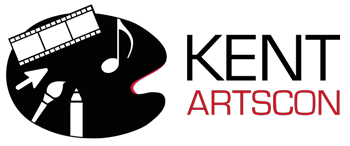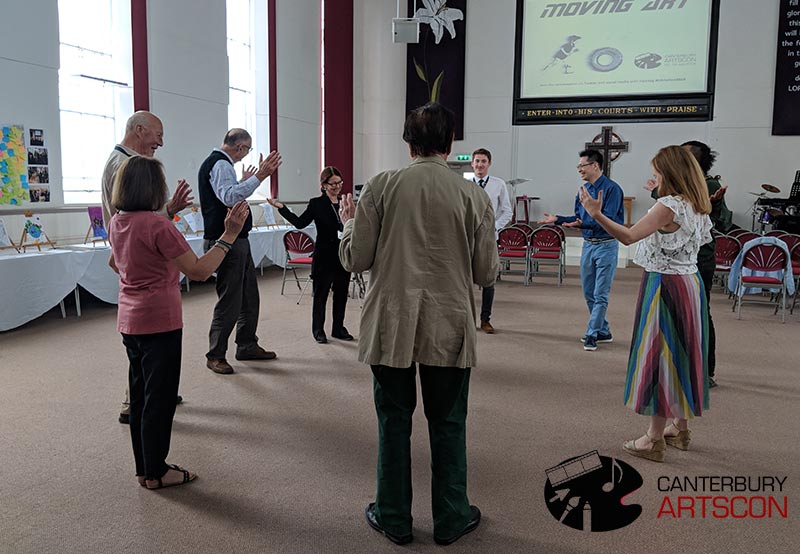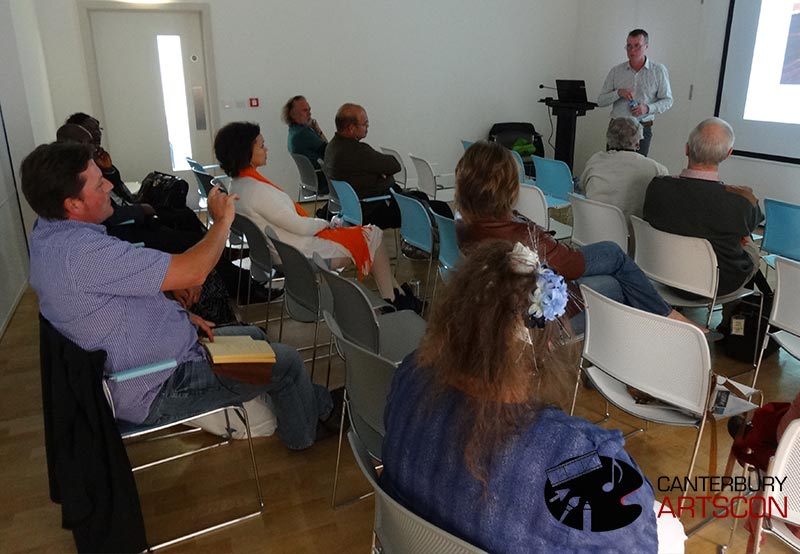Academic papers will be read at the conference. The maximum length of time for each reading will be 30-50 minutes. There will be time for a Q&A after each reading. Abstracts (proposals) submitted may include graduate papers and papers proposed for publication—and accompanying slide shows are welcome. Abstracts may utilise quantitative or qualitative approaches or their combination in mixed methods. The following will be accepted: Descriptive studies; review articles; analytical/discussion papers; strategy papers; business plans; scientific papers; phenomenology; ethnography; narrative; and research papers. All submissions should be related to the conference theme. There is a limit of two submissions per author. Individuals selected are expected to attend the conference. An abstract summarizing the subject and theme of your paper must be received by 30 May 2025. A Final Copy of your paper must be received by 20 June 2025.
There will be an art exhibit, in all media, at the conference. The art does not need to overtly address the theme; however, exhibiting artists will each deliver a short (5 minutes or less) statement on how art as a vehicle for building bridges influenced the work, at the opening of the exhibit. Artists will be required to submit a written statement (50 words or less), which we will include at the exhibit, along with a brief bio. Artists will be expected to offer their submissions for sale. 20% of all sales will go to Warnborough College, to pay for the exhibition space. We will accept art in any media: painting, sculpture, fibre art, photography, ceramic, jewellery, fabric, assemblage, collage, mixed media, etc. Size specifications will be determined shortly. Please Just let us know what you have in mind. Submit images of finished works, or works-in-progress, in JPEG formats. JPEGS must be 300 dpi and maximum 1024 pixels on the longest side. Include the title and dimensions of the work, and a one-sentence description of the piece. Artists selected to exhibit their artwork will be responsible for its transportation to the venue on July 11 at 8:30am. All art must be exhibit ready. Artists will be responsible for retrieving their entries at the close of the conference. There is a limit of two submissions per artists. Deadline for submission of JPEGs of works in progress and one-sentence description of each work is due 30 May 2025. Images of final submission, bio, and written statement will be due 20 June 2025.
There will be a festival of ‘short shorts’ from all genres at the conference. The maximum length for each work will be 8 minutes (including all credits). Live action, animation, documentary, dance/performance, fine/art conceptual, and music videos are welcome. Laughing and crying are both cathartic — and relate to our theme —so comedies and dramas are equally encouraged. The work must be original and cannot include previews and advertising films, sequences from feature length films, unaired episodes of established TV series, unsold TV series pilots, and/or any previously copyrighted materials. The shorts do not need to overtly address the theme, however participating artists who attend the conference will each deliver a short (3 minutes or less) statement on how illusion influenced the work or vice versa. Participants who do not attend the conference will need to send a 1-2 minute statement on how art, as a vehicle for building bridges, influenced the work, in a separate file. There is a limit of two submissions per artist. Summary of film(s) must be received by 28 April 2025. Rough cuts of works in progress must be received by 30 May 2025, in .mp4 formats (or formats that can be converted to mp4). Final cuts of accepted works must be submitted in the highest resolution quality formats, along with a finalised artist bio, and the video statement (if the artist will not be attending the conference). Those artists who will attend the conference must submit a brief written statement. All final materials must be received by 20 June 2025.
Visual presentations (including demos) will be delivered at the conference. The maximum length of time for each presentation will be 40 minutes, and strict adherence to that timetable will be required. There will be time for a Q&A after each presentation. Participants will not read their presentations. They must talk about their chosen subject matter in a lively fashion—and visuals must accompany the presentations. Abstracts must summarise the subject and nature of the presentation, and indicate how it relates to our conference theme. The following will be accepted: Slide shows (incl. Power Point presentations); demonstrations (using tangible materials and props); object lessons; show and tell presentations; and, other presentation formats. There is a limit of two submissions per presenter. Individuals selected are expected to attend the conference. A proposal abstract of your presentation must be received by 30 May 2025. Final presentations must be received by 20 June 2025.
There will be 40-minute creative writing workshops open to all skill levels, which in some way address the conference theme. Instructors will offer ‘Being a Writer’ workshops, during which time a short writing or screenwriting exercise will be explored. All workshops must be designed to be “doable” for all skill levels (including novices) and the goal will be for each attendee to complete a writing exercise during the session. There is a limit of two submissions per instructor. An abstract (proposal describing the workshop) and a list of equipment needed must be received by 25 April 2025. A resumé indicating your qualification to lead the workshop, a final proposal must be received by 30 May 2025. A Final Syllabus or teaching outline must be received by 20 June 2025.
There will be 40-minute art workshops open to all skill levels, in all media, which in some way address the conference theme. Instructors will offer ‘Be an Artist’ workshops, for which supplies will be readily available. Instructors will be responsible for providing all supplies to attendees. Instructors should ensure that they do not overspend on the cost of supplies. Where there exists surplus funds, instructors may be reimbursed up to US$5 per workshop participant, upon presentation of receipts, but this is not guaranteed. Typically, workshops will be attended by between 10 to 20 attendees, depending on the size of the venue. Instructors must deliver all supplies to the workshop venue on the day of the event. Tools supplied by Instructors will be returned to them at the end of the workshop. However, no highly toxic substances or dangerous tools/materials may be used. All workshops must be designed to be “doable” for all skill levels (including novices) and the goal will be for each attendee to complete a simple project during the session. There is a limit of two submissions per instructor. An abstract (as per the general guidelines) describing the workshop must be received by 25 April 2025. A resume or proof of your qualification to lead the workshop, and a JPEG of a sample project must be received by 30 May 2025. A Final Syllabus along with a complete list of tools and materials that will be provided at the workshop must be received by 20 June 2025.
There will be 40-minute art history classes offered at the conference. Topics may include (but are not limited to) specific periods, artists, styles, and/or movements in art, curricula development, methodologies, curatorship, and business and professional development. All topical programs will need to be related, in some way, to the conference theme, and should appeal to both newcomers to art history and professionals. Any curricula development programs should utilize the theme to demonstrate facets of the system or methodology. These classes must be designed to encourage attendees’ participation, so the approach should be interactive. The instructor is welcome and encouraged to use visuals, and may issue hand-outs of 6 pages or less to each attendee, as long as they can be reproduced on a regular copier machine. (No fancy bells or whistles!) There is a limit of two submissions per instructor. An abstract (proposal describing the class) and a list of equipment needed must be received by 25 April 2025. A resumé indicating your qualification to lead the workshop and a final proposal must be received by 30 May 2025. A Final Syllabus or teaching outline must be received by 20 June 2025.
There will be 40-minute classes offered at the conference on topics in radio, film and/or television. Topics may include (but are not limited to) specific periods, artists, styles, and/or movements in these media forms, history, curricula development, methodologies, and business and professional development. All topical programs will need to be related, in some way, to the conference theme, and should appeal to both newcomers to film, radio and TV, as well as professionals. Any curricula development programs should utilize the theme to demonstrate facets of the system or methodology. These classes must be designed to encourage attendees’ participation, so the approach should be interactive. The instructor is welcome and encouraged to use visuals, and may issue hand-outs of 6 pages or less to each attendee, as long as they can be reproduced on a regular copier machine. (No fancy bells or whistles!) There is a limit of two submissions per instructor. An abstract (proposal describing the class) and a list of equipment needed must be received by 26 April 2024. A resumé indicating your qualification to lead the workshop and a final proposal must be received by 31 May 2024. A Final Syllabus or teaching outline must be received by 21 June 2024.
We will hold an industry panel during the conference. Sub-topics related to the broad theme will be examined, on subjects that are current, relevant, and somewhat debated in the fields of art, art history, and creative writing. There will be a call for industry practitioners, academics and other professionals to form a panel to lead the discussions. There will be one moderator. The overriding goal of this event is participation and information exchange by the attendees. The panel discussion will run for 40-minutes followed by a 10-minute Q&A. If you are keen to participate as a panellist, please provide your name and curriculum vitae by 30 May 2025. Any masters of hand-outs to be distributed must be received by 20 June 2025.
There will be a café event, featuring readings, book signing, and sales. This is open to “indie” (independently published) authors who have self-published (or will publish) a work independently, or through a small independent press, by the time of the event. Your book does not necessarily need to overtly address the theme. All genres are welcome, however emphasis will be placed on fiction. Featured authors will each read an excerpt from their book (for about 10 minutes)—and will sign books during the event. Warnborough College will earn a 20% commission on all books sold at the event. Contributing authors will be responsible for getting their books to the conference. All authors interested in participating should send a brief bio, book title, and brief book summary by 30 May 2025. Final confirmation of your attendance must be received by 20 June 2025.


